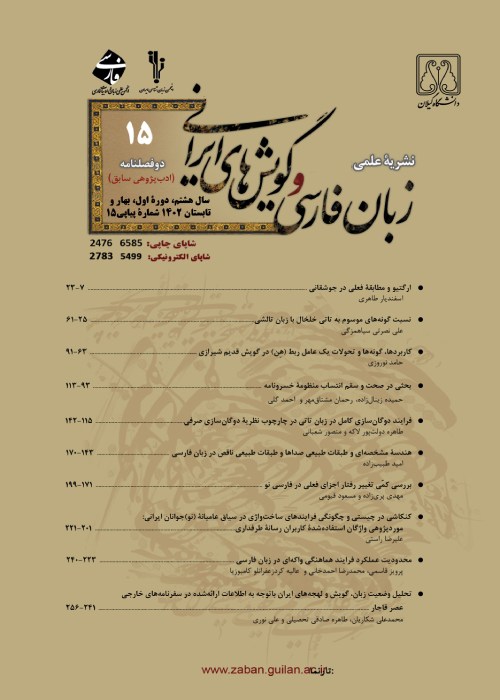The Mechanisms of Euphemization in the Novels of the Constitutional Period A Case Study on: “The Orphans’ story”, “The Interview”, and “The Black trick”
In this research, the main objective was to enumerate the types of euphemism in the novels of the Constitutional period and to compare them with the literary works, and cultural and social situations in addition to analyzing their evaluation through time. For this target, three novels “The orphan’s story”, “The interview”, and “The black trick”, which are considered as social novels of the Constitutional period, have been studied. In this research, the words based on the context, the narrative situation, and the concept they contain were examined and consequently were analyzed regarding the euphemism construction mechanism. Based on this study, it is argued that euphemisms, in addition to their main concept, include certain implicit meanings. These implications can be constructed in a particular community, or in a historical period and can also carry a certain emotion and ideology. Moreover, they can be used for taboo words and concepts. In this article, it has been shown how novels express social, cultural and moral concepts of the Constitutional period through euphemisms. The mechanisms of euphemism are verbiage, brevity, metonymy, metaphor, irony, descriptive phrase, adduct, use of non-Persian words, use of ancient Persian words, and repudiation questions.
In this research, three novels namely“The orphans’ story”, “The interview”, and “The black trick” that belong to the Constitutional period were carefully studied. Euphemisms are words that have certain semantic load and can convey the author's intentions through specifically semantic, emotional, sentimental, and even ideological burden. Euphemism is the best word that can, to the best form, convey the author's intent. The most important criterion in choosing euphemism is the amount of knowledge and awareness of the audience. In this regard, the author, according to the collective and ideological consciousness of the target community, tries to use the best words to express her/his intention. This choice, if done correctly and accurately; at first, attracts the audience’s attention to the story; and then will be able to influence her/his social, cultural and moral bias. According to this, euphemisms are categorized in three categories namely historical-social, emotional-ideological, and complimenting words against taboo words.
Euphemism is the use of polite and respectful instead of unpleasant or offensive words or phrases. Euphemism can be considered as “a purely lexical phenomenon which is used to replace taboo words and expressions for polite language applications” (Mousavi and Badakhshan, 1395: 56). The use of euphemisms causes explicit and unpleasant meanings to appear in a new pleasant format. In this new context, words will be more engaging and effective. Therefore, we can assume Euphemism as “a form of creation, literary invention, or even semantic aberration” (Norouzi and Abbaszadeh, 1389: 152). It is noteworthy that we can claim “This is euphemism” only when the audience understand the indirect use of words or phrases which are indicating the speaker's desire to refer to an implicit meaning in a polite manner. Therefore, the meaning of the words will be determined by the context (Warren, 1992: 132).
In order to study the Euphemism, three novels belonging to the Constitutional period namely “The orphans’ story”, “The interview”, and “The black trick were selected. To cultivate theoretical foundations, the library method was used. In this article, the study of euphemism was performed within the framework of lexical approach and was limited to the level of lexical items. Ironic expressions, descriptive or additional expressions, metaphors, and repudiation questions which were used in the form of complex words bearing a single meaning were considered as euphemism.
According to the present study, euphemisms were verifiable in three categories namely historical – social, emotional – ideological, and complimenting words against taboo words. Historical – social euphemisms used by native speakers emerge according to the social conditions and characteristics and also the historical period. Emotional – ideological euphemisms contain the emotions, feelings and ideology of the language and can express people's approach to a particular issue. Next to these two groups are euphemisms that are used in contrast to taboo words. The mentioned types of euphemism can be transformed crossing a historical era or stay the same. It can be said that the evolution of words depends on the social and cultural evolution of the target society. 5. Conclusions & Suggestions Based on this study, it was argued that euphemisms are tools of significance which provide the writer with a variety of expressive possibilities. In this regard, it can be observed that using this tool by the writer accurately and intelligently and in order to express social, cultural and moral ugliness in an aura of ambiguity, can have a deeper impact on the audience. In other words, if the authors of the novels under survey in this research did not use euphemism, they could not express their personal opinions. Euphemisms in addition to the semantic load, bear historical noteworthiness and carry social, cultural, ethical, emotional, or ideological burdens. Therefore, it can be claimed that they represent the features of social attitude, historical development, and the way culture and ethics flow in society. Moreover, they include the author's personal feelings and emotions and can convey these feelings and emotions to the audience so that they can have a deeper impact on the audience than what the neutral words may have.
- حق عضویت دریافتی صرف حمایت از نشریات عضو و نگهداری، تکمیل و توسعه مگیران میشود.
- پرداخت حق اشتراک و دانلود مقالات اجازه بازنشر آن در سایر رسانههای چاپی و دیجیتال را به کاربر نمیدهد.



